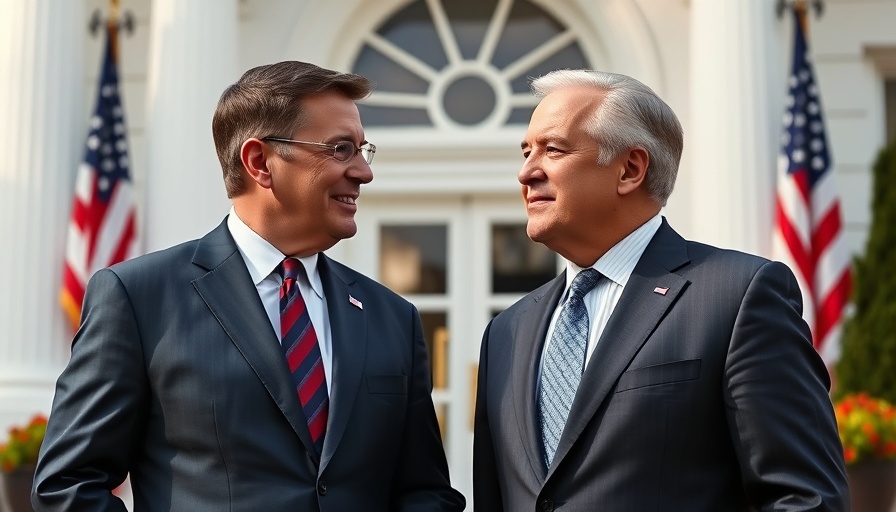
Trump's Tariff Threats: A Damaging Forecast for Ireland
As global trade tensions rise, Irish Taoiseach Micheál Martin has voiced concerns regarding the potential impact of President Donald Trump's proposed 200% tariffs on European goods, notably wines and alcohol. Speaking in Washington, Martin emphasized that tariffs not only create uncertainty but also lead to increased prices for consumers, damaging both trade and business interests. This scenario raises critical questions about the future of Irish exports and the broader economic relationship between Ireland and the United States.
The Economic Landscape: Trade Surplus and Vulnerabilities
Currently, the United States is Ireland’s largest trading partner, with Irish exports to the U.S. reaching an impressive €54 billion in 2023. This trade relationship is significantly tilted in Ireland's favor, as it enjoys a large trade surplus, driven largely by exports in the pharmaceutical sector. Critics argue that Trump's tariffs could disrupt this delicate balance, which is vital for the Irish economy, especially given the country’s dependence on its pharmaceutical exports to major U.S. corporations like Pfizer and Johnson & Johnson.
Why Tariffs Can Be Counterproductive
Analysts are raising alarms about the broader implications of Trump’s trade policies. The proposed tariffs could lead to a rise in consumer prices, indicating a detrimental ripple effect on average citizens, regardless of their location. Aengus Kelly, CEO of AerCap, highlighted this potential outcome, noting a hypothetical increase of $40 million on a Boeing 787 if tariffs were to be imposed.
In his remarks, Martin expressed hopes for a resolution through dialogue, underscoring the importance of negotiations to reach a settlement both sides can accept. The implications of such tariffs may go beyond economics; they can also strain longstanding personal and historical ties between the U.S. and Ireland.
The Impact on the Pharmaceutical Sector
The Irish pharmaceutical industry is especially threatened by Trump’s tariffs, as it exports goods at a high proportion compared to other EU countries. According to reports, nearly 28% of Irish exports are tied to pharmaceutical and chemical products. If tariffs are enacted, the resultant price increases may deter U.S. buyers, consequently impacting Irish GDP and its position as a manufacturing hub.
Experts like Supriya Kapoor from Trinity College Dublin stress that heightened tariffs could destabilize the delicate supply chains that currently exist, eroding the favorable trading environment that has benefitted both U.S. consumers and Irish manufacturers.
Historical Context: The Cycle of Trade Wars
The current standoff echoes previous tariff disputes, highlighting the cyclical nature of trade wars. Historically, such contention has only led to reciprocal tariffs and heightened economic isolation. The EU's unified response emphasizes collective action in navigating challenges imposed by the U.S. tariffs, but similarly warns of retaliatory measures that could exacerbate tensions.
Martin’s optimism amidst these challenges—pertaining to meeting with President Trump and lauding historical ties—suggests a diplomatic approach might be feasible in finding a resolution. However, the unpredictability of Trump’s administration raises legitimate concerns about how long such positive sentiments can endure within the sphere of economic policy.
Strategies for Moving Forward: What Irish Businesses Can Do
As the situation evolves, Irish businesses must strategize to mitigate potential disruptions caused by tariffs. The Irish Exporters Association has advised companies to assess their exposure and consider diversifying their supply chains to reduce dependency on any single market. Engaging with U.S. multinationals, as suggested by Irish Foreign Minister Simon Harris, could also help bolster Ireland’s position in negotiations.
This proactive approach allows the Irish economy to remain resilient despite the current uncertainties, potentially reinforcing the message that trade relations must adapt while maintaining strong ties with the U.S.
Conclusion: The Call for Cooperative Strategies
The ongoing trade tensions underscore the fragile nature of international trade relationships, particularly between the U.S. and Ireland. As these developments unfold, cooperation and dialogue will be essential in navigating these turbulent waters. Irish stakeholders must remain vigilant while advocating for policies that protect their economic interests against the daunting specter of tariffs.
In this climate, it is crucial for stakeholders to stay informed and engaged. Understanding the implications of these trade policies can help shape future decisions and strategies, ensuring a balanced outcome for all parties involved.
 Add Row
Add Row  Add
Add 



Write A Comment